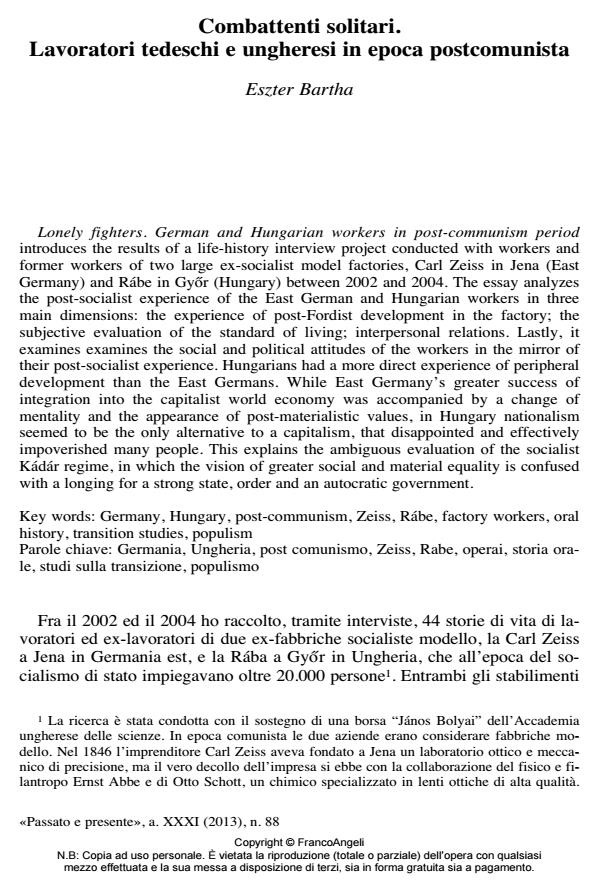Combattenti solitari. Lavoratori tedeschi e ungheresi in epoca postcomunista
Titolo Rivista PASSATO E PRESENTE
Autori/Curatori Eszter Bartha
Anno di pubblicazione 2013 Fascicolo 2013/88
Lingua Italiano Numero pagine 20 P. 37-56 Dimensione file 136 KB
DOI 10.3280/PASS2013-088003
Il DOI è il codice a barre della proprietà intellettuale: per saperne di più
clicca qui
Qui sotto puoi vedere in anteprima la prima pagina di questo articolo.
Se questo articolo ti interessa, lo puoi acquistare (e scaricare in formato pdf) seguendo le facili indicazioni per acquistare il download credit. Acquista Download Credits per scaricare questo Articolo in formato PDF

FrancoAngeli è membro della Publishers International Linking Association, Inc (PILA)associazione indipendente e non profit per facilitare (attraverso i servizi tecnologici implementati da CrossRef.org) l’accesso degli studiosi ai contenuti digitali nelle pubblicazioni professionali e scientifiche
Introduces the results of a life-history interview project conducted with workers and former workers of two large ex-socialist model factories, Carl Zeiss in Jena (East Germany) and Rábe in Gyo´´r (Hungary) between 2002 and 2004. The essay analyzes the post-socialist experience of the East German and Hungarian workers in three main dimensions: the experience of post-Fordist development in the factory; the subjective evaluation of the standard of living; interpersonal relations. Lastly, it examines examines the social and political attitudes of the workers in the mirror of their post-socialist experience. Hungarians had a more direct experience of peripheral development than the East Germans. While East Germany’s greater success of integration into the capitalist world economy was accompanied by a change of mentality and the appearance of post-materialistic values, in Hungary nationalism seemed to be the only alternative to a capitalism, that disappointed and effectively impoverished many people. This explains the ambiguous evaluation of the socialist Kádár regime, in which the vision of greater social and material equality is confused with a longing for a strong state, order and an autocratic government.
Parole chiave:Germania, Ungheria, post comunismo, Zeiss, Rabe, operai, storia orale, studi sulla transizione, populismo
Eszter Bartha, Combattenti solitari. Lavoratori tedeschi e ungheresi in epoca postcomunista in "PASSATO E PRESENTE" 88/2013, pp 37-56, DOI: 10.3280/PASS2013-088003